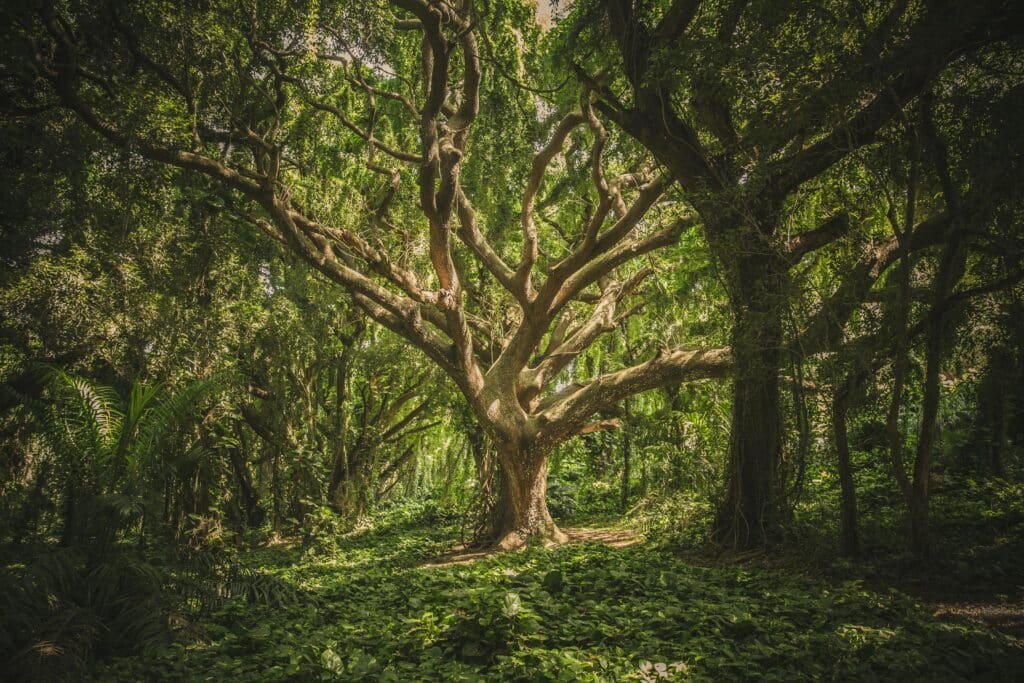“The voice of the LORD twists the mighty oaks and strips the forests bare. In his Temple everyone shouts, “Glory!” (Ps. 29:9 NLT).
I was sitting in meditation in my back yard today and was interrupted by a yellow jacket buzzing around my business. Since I swell up like a deformed melon when I get stung, I jumped up and darted to safety. Scientists tell us that yellow jackets are technically not bees; they are a kind of predatory social wasp. As far as I know, they could be demons who have shapeshifted into terrifying little things, but I stray.
I made my way back to my quiet place in the yard and read Psalm 29. In this Psalm, David reflects on the supremacy of God over the natural world. He emphasizes God’s transcendence, His otherness. This directed my mind to thinking about how much I love nature and how it has the potential to draw me closer to God. Being in nature sets my mind at ease, helps me to relax, points me to God.
We need metaphors to help us understand God. Otherwise, how can the earthly finite mind comprehend anything of the heavenly infinite Mind? How can mere humans entertain and grasp even an inkling of God’s ways? Jesus spoke in metaphors and parables to teach us spiritual ideas. He claimed to be the light of the world and the shepherd of the sheep. Metaphors are essential. Whether we are consciously aware of them or not, they encompass us every time we step outside and enter the natural world—its ruggedness, unpredictability, beauty, and at times, danger. Basking in the sun provides for me just a hint of his glorious brightness. Even running from wasps can teach me something about God.
We must never forget that we live in a fallen world. This beautiful world teaches us both spiritual secrets as well as dark and disturbing realities. Disease carrying insects plague many parts of the world. Even in the relative safety of these Appalachian hills in which I live, I hear stories of children getting infected with encephalitis or meningitis acquired from mosquito bites. Whether reminded by large scale natural disasters or a random attack by a cougar, we recognize that nature is not always safe.
Ironically, in our attempt to shut out the venomous stings of the natural world with our artificial existence, we have potentially made our world even less safe. Our exploitation of nature and the resulting pollution has left many waterways unsafe or virtually dead. Our air is not as safe to breathe as it once was, especially in our cities; our soil is not as rich or clean to grow our crops in many places as it was for our forebearers.
I am again reminded of the importance of metaphor. Perhaps God is not always safe. Could it be that God wants us to both love and fear Him? Depending on how you understand the idea of safety, God may not be safe, but this is not the same as questioning or denying his goodness or his wisdom. On a human level, we understand safety in a certain way. We expect parents, soldiers, and police to protect those in their care from danger, harm, or evil.
God operates on a different level altogether. While God is concerned with our physical or temporal well-being, his perspective is different. It is perfect. He is flawlessly aware of our true spiritual needs and is concerned with building up the inner human. If the two areas of need (temporal and eternal) come in conflict, I’m guessing that God is going to pick the eternal need first. I’m not suggesting that the spirit is intrinsically better than the body in the Platonic sense, but it will endure after these bodies are gone. In fact, it may be because of his goodness or wisdom that he allows calamities and tragedies of nature to inflict us—in order to build in us something of a higher spiritual value.
God may seem wild and unpredictable. However, while God operates in a logical way consistent with his perfect nature, we cannot see the complete picture. In Christ, we can begin to understand God as both lamb and lion. Akin to our experiences with nature, there are aspects of God that bring us peace; there are also aspects of God that make us uncomfortable. We cannot reject the lion and replace it with the lamb. We must accept both if we are to practice an authentic faith and be led to true worship.
When I hike through the woods, my senses are alive. I smell the moist earth and the complex flora surrounding me. I listen to birds chirping in trees and squirrels scampering on dry leaves. I notice patterns in the canopy or among the rocks and undergrowth. It would be easy to allow the repetitious designs of the forest to dull my senses. However, I have taken in wisdom from my time in the woodlands. When I see, hear, or smell something that fractures from the routine, I am notified to be even more watchful. I must stay alert in this haven of peace and tranquility, for danger may lurk with my next step.
This is life. We have our routines and daily challenges. Most of the time, all is relatively well. Then something changes. Tragedy strikes and shakes our world. We are tempted to question God’s goodness or wisdom. If we have spent ample time trusting God during better times, we are more prepared to trust him during more challenging times. It is through our routine times of trusting God, reading his Word, and praying that we gain the depth of insight to recognize that God is unpredictable. We also have gained an unshakeable conviction that God is always good and full of love and wisdom. When tragedy strikes, we do not shriek in terror. We do not feebly approach God as a distant acquaintance. Like the Psalmist and those in the Lord’s temple, we shout praises of his glory even while we bow our hearts in awe of a fierce and mighty king.
Do we really want a tame God? Perhaps we think we do, but tameness implies subjection, and our responsibility is to subject ourselves in humility and trust to God, never the other way around!
Nature points us to God as both intelligent Creator and sovereign King, always with our best interest in mind, but not as predictable as we might expect. Our experience with the natural world helps us to understand God more profoundly, but this does not mean that I will not jump and run the next time a yellow jacket invades my personal space.
Copyright, ©, Ryan Snuffer, September 2024.
E-mail comments or questions to ryan@questionreality.org

Ryan Snuffer
Ryan Snuffer is an Editor and Contributor for Apologetics, Inc. He is an apologist, author, editor, speaker, and artistic soul who lives in Beckley, West Virginia with his wife, Kellie, and son, Luke. He co-authored Love Your Neighbor with Norm Geisler and contributed to the Apologetics Study Bible for Students. He is in the process of writing his memoirs related to the passing of his beloved daughter—a truly miraculous and moving story that is published in part on his site, www.lifelynx.net.


1 thought on “When Wasps Chase Us: How to Find God in Nature’s Unpredictability”
Beautiful, heartfelt and profound. I agree that Nature brings us closed to God, our creator.